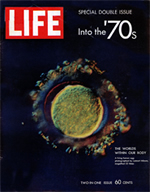
Life Magazine
January 9, 1970
Who Am I Anyway?
This personal monologue is adapted from two tape-recorded question-and-answer sessions with Barbra Streisand. The unusual portrait was photographed by Lawrence Schiller.
There is this joke about a girl who went to the hairdresser and said, "Give me a Barbra Streisand look." So he took the hairbrush and broke her nose. I guess I do have a strange face. I mean most people have a face that if you look at it from the front it ties in with how it looks from the side. Mine doesn't. I look quite different from each side. It seems to be the same with my personality.
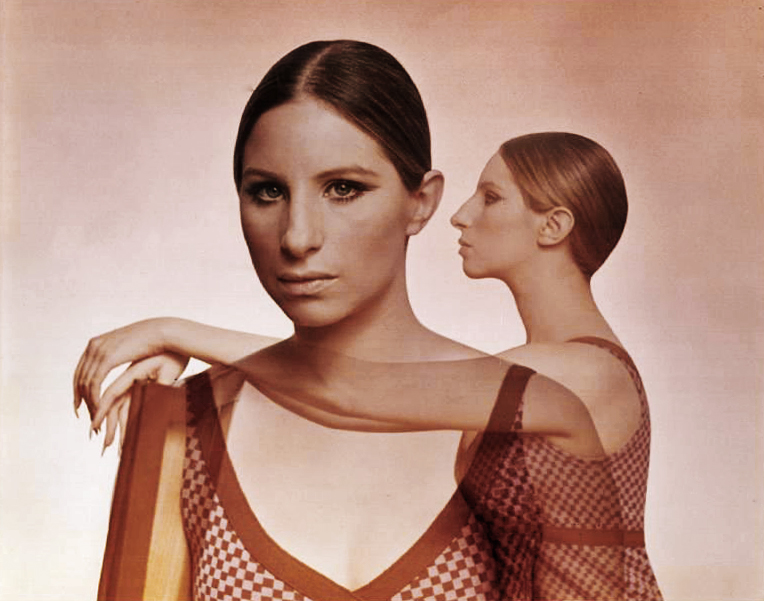
I'm an adolescent who is very mature; I'm lazy and ambitious; I love fancy food, beautifully served, yet enjoy it most when it's simple, reheated and eaten out of a pot; I love rice pudding from a diner on 10th Avenue and the chocolate souffle from "21"; in the movies I care about how I look, but would rather sleep the extra half-hour than put on false eyelashes; I would like my figure to look great but wouldn't dream of refusing that extra piece of pizza; I have been on the best-dressed list and at the same time on the worst-dressed list; I have been called crude and I have been called elegant; I have been called ugly and I have been called beautiful.
There have been all kinds of stories about my success, the truth is—when I was 12 years old, I stumbled on a booklet describing the symptoms of a fatal disease. I developed all seven symptoms immediately. I figured I had very little time left, so I went to work in a Chinese restaurant to earn money to study acting. As if dying wasn't enough, since I'd been 8 I'd had a buzzing in my ears. It started the first night my new stepfather came home. I told my mother and she gave me a hot water bottle to sleep on, and never asked me about the noises again. For so many years it was a secret hidden inside me, inside my head. At first I wrapped scarves around my ears, but that only drove it in deeper. It must have looked pretty peculiar since it was 94° out. I think that's when people started calling me different.
The buzzing makes me very sensitive to sound. It's probably some messed-up nasal thing which gives me the quality in my voice. But I never felt normal and I guess I walked around like a forbiss—which means kind of depressed. I get these letters from kids today telling me that I am "different" just like them. I write back and ask, "Do you have a buzz in your ears?"
As kids, we used to sit on the stoop in Brooklyn and harmonize. I used to imitate Joni James. But I never wanted to be a singer. Singer? Maybe I don't like the word. I never knew how hard I should pronounce the "g."
I just wanted to be an actress. At 15 I had the most creative period of my life. I went to two acting schools, one under an assumed name: Angelina Scarangella. (The name came in very handy three years ago when I had my baby and didn't want him to be stared at in the hospital; to find him through the nursery window you had to look for the bassinet with the name "Scarangella.") In acting class I was doing Lorca and Molnár, Tennessee Williams and Shakespeare and Greek tragedy. I could feel something that transcended the intellect take over and live its own life.
I remember doing a scene from The Rose Tattoo. To me, the scene was about a girl who was going through a sexual awakening. I gave myself the image of being on fire and the boy was ice. But that came out a little too passionate and painful. So I changed to a very technical thing—that of touching him whenever and wherever I could. I remember standing on his feet, jumping on his back. I touched him with my eyes closed, like a blind girl searching. It was awkward, it was sad, it was funny, it was—I think—right.
Once I was a chocolate chip. It was an exercise in giving life to inanimate objects. I was stuck into a sticky batter, put into an oven where I swelled and started to melt and burn. I was taken out of the oven where the air congealed my outer layer, leaving my insides mushy. My head—meaning my point—started to droop when somebody ate me. Chocolate chip cookies have never tasted the same.
The whole point was to experience something organically, to lift it from an intellectual level and give it a physical life.
But at 18 I still couldn't get work as an ac- tress. I had this old raincoat and I wore black tights and I couldn't even get hired to play a beatnik. I went to auditions and readings and was usually abruptly dismissed.
I was humiliated—people looking at you like you're crazy. It was their opportunity to say, "You sit in the corner there, you wait in line there." There's some paranoia mixed in there, but I decided I was not gonna come back and knock on their doors and tell them that they've got to hire me. My pride as a person was more important to me than a job.
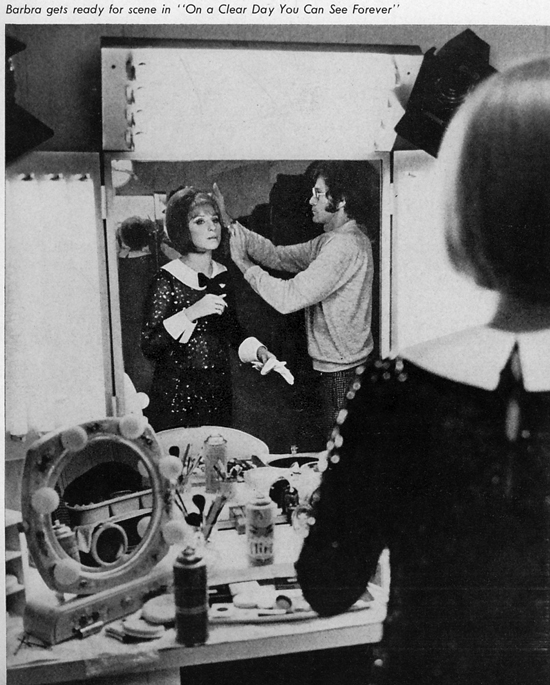
Finally I had to sing. I'd been working as a switchboard operator and was let go. I went on unemployment insurance and got caught in a lie. I was supposed to be looking for work as a switchboard operator, but instead I went looking for work as an actress. The penalty was standing in line for five weeks before I could receive another check. How could I do that? What a waste of time.
There was this nightclub talent contest where you got $50 a week and your suppers. That's all I had to hear because I've made many a deal based on a meal. I learned this song, A Sleepin' Bee, and first I tried it out on my closest friends in their kitchen. I was so embarrassed, I couldn't sing in front of them, so I asked them if they wouldn't mind, I'd sing facing the wall. When I finished, and turned around, I remember I couldn't understand why they had tears in their eyes. Anyway, I won the contest.
Then I was hired to sing at the Bon Soir in the Village. When my mother came on the second night, I wore a white lace combing jacket from 1890 with pink satin shoes from the '20s. My mother was sure I was singing in my nightgown. But to me it was beautiful.
A few days later I realized people were talking about this girl who sings in these weird clothes. They thought it was a gimmick, so I went back to the thrift shop and bought a couple of daytime dresses. Then I sang in wool.
I still wear my thrift shop goodies. A great, fantastic fur coat from the 1920s for $10. I used to get lovely dresses at resale shops where rich ladies got rid of their stuff. What's to be ashamed of? Those ladies were clean.
These ridiculous sums for singing one night. They're so unreal. I never see it, anyway. I only see it on a list called disbursements. I have this bank account I've had since I was 16 when I went to work and put in $15 a week. And to this day—like I got this royalty check for a song I wrote: $38. That goes in this account. I lent my car to the movies for two days: $100. I wrote the liner notes for my album: $50. That's real money, you see. That's money I feel I've earned. I have about $1,500 or $2,000, which is a lot. And if I ever get into any trouble sometime . . .
But I started telling about this job at the Bon Soir. I thought, I'm an actress and what am I doing here singing? Until I realized each song is another play, another character. When I used to sing Cry Me a River, I had a specific person in mind; I tried to re-create in my mind the details of his face. The song no longer works for me as well, mostly because I don't feel that way toward that person anymore.
But a lot of times while you're singing, you're going through "I don't feel anything. I don't even feel like singing." Maybe you're wondering where will you eat after the show; am I in a mood for Chinese or Italian? That's a big decision to make.
And you can use the fact that you feel nothing, rather than straining for some counterfeit, cliche emotion. After all, what is nothing? In acting class when I was 16 I saw that even the most seemingly dull person became interesting when he was concentrated and focused on even a simple thing such as relaxing and didn't have the time to keep up his facade. When he was stripped of his defenses, he became fascinating by just "being." I discovered the "something" in "nothing."
Maybe in a song you're supposed to be angry, but you're too tired to get very angry. So the words might come out very quiet which is often the essence of anger. You've discovered something by accepting your own reality at that moment. When I was in Funny Girl on Broadway, I usually showed up and just went onstage without any preparation. This bothered me until I realized that my preparation is not to prepare, that I wanted to be thrown onstage to cope with whatever reality I found.
A lot of my success is bui It on this truth thing. I can't lie. By being honest — somehow that transmits itself to people. I don't reach toward audiences. I have found that the more I am concentrated within myself, the more the audience is drawn to me. I also don't like to spell out everything so completely; I want the people in the audience to participate, to use their imagination, to relate the songs to their own lives. In other words, I hold back the tears so that the audience can cry.

(Photo, right): Her son Jason wanders in as Barbra and others from movie hear playback of "Clear Day" music
So performing becomes an instinctive thing. I don't sing the same song or play the same scene exactly the same way twice. There is a basic interpretation, but I always leave myself open to the possibilities of the moment.
I am terribly lazy. But maybe that's because I'm afraid that if I worked harder, I wouldn't accomplish any more. But then again, maybe I'm just plain lazy. I can't even stand to bend down and pick up the birds in badminton. That's why I love being in movies. I'm performing all over the world—while I'm sitting home taking a bath.
I love the movies—life is so tentative and short that I want something to remain as proof that I existed. I think that's why I like antiques —because they have proven their immortality. They know something I don't.
The theater was always frightening to me, because once I stepped on the stage, I was stuck. I used to think, "What if you have to go to the bathroom?" At least in the movies you can say, "Could you wait a minute?"
There are so many things to do in life. Art galleries to visit, museums to go to, books to read—and it's so overwhelming that I'd rather just make the movie and be busy from 10 to 6 and not have to think of all the things I should be doing. And actually, the real, real reason I like to be in movies is because it's an easy place to have my hems done. There's always a seamstress on the set. And if you break a chair they can fix it—they have people who do everything. Chair people, hem people.
Oh, yeah, back to the Bon Soir: at that time I got a special sort of satisfaction out of performing because all of a sudden . . . well, in life I felt that people didn't pay any attention to me. You know, when I would talk it came out so enthusiastically that they would disregard it. On the stage, singing, I could say what I felt—and I was listened to.
I don't understand the obligations of being a "star." I still can't understand the rumor and gossip market, distortions in the press, the intrusion on privacy. In my professional life, I am willing to be judged; my work is available for closest scrutiny. But my private life is my own, my most prized possession.
When somebody asks me if I am Barbra Streisand, I always say no. If they have to ask, how do you say "Yes"? I say, "Oh, no. I look like her, but . . ." Or sometimes I talk with my accents. One minute somebody will recognize me on the street and the next minute I'll have to show my identification to get a check. Am I famous or not famous? Who am I, anyway? I'm waiting in a lobby and somebody over there smiles at me. What the hell is that stranger smiling at me for? Then I go, "Oh, yeah. I guess I'm what's-her-name."
When I'm with my child I don't like to sign autographs, and yet in those situations I've had people yell at me, "Aw, you stink. You're this and that. I'm not going to buy your records anymore."
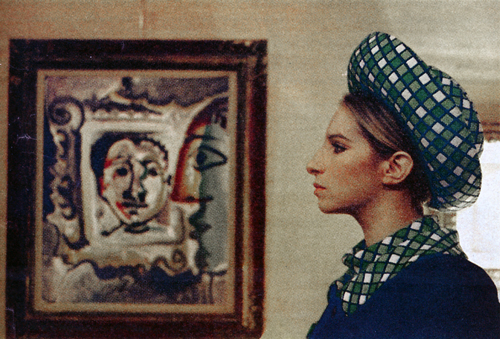
(Photo, left): Streisand views Picasso's "Profil et Tableau"
Sometimes I'm eating — sitting there with sparerib juice all over my hands. People will come up and say, "Look, I know this is terrible, and I really hate to do this, but could you sign this?" And I say, "Obviously you don't hate it enough, you still came over." I mean why pick a moment like that? Do they want a greasy autograph? The people who want autographs have nothing to do with my work. I remember I was singing in Detroit when Mae West came there with her play Sexfeffe, and I remember looking in the tent trying to catch a glimpse of her. But I could never, never have the kind of guts to bother her.
But in general the kids today are really great. That's a beautiful sign they make with their fingers. It's an unspoken sort of camaraderie. Sometimes kids come to me, just hand me a pair of beads. Don't ask for my autograph. I really am thrilled by that.
Being very to the point and blunt used to be a kind of weapon for me. But I'm not as de- fensive anymore. I just really am blunt. That saves me a lot of time and also loses a lot of friends.
I was never taught tact. And when I was a kid I always ate with my feet up and never knew you were supposed to put a napkin on your lap. At home itwas always like you stand over a pot and eat. There were no regular meal times and if I came home I'd get my plate. When my brother came home, he got his. My mother always ate in the kitchen. I'm absolutely passionate about food. Did you ever have the mussels at Oscar's on Third Avenue? They're steamed with fresh vegetables, seaweed and garlic. My favorite breakfast is baked potatoes with sour cream and caviar. I love avocados because they have such a subtle taste that you can't remember it. You have to eat another avocado. It's like gardenias. Their smell can't be captured. It's like some little will in there saying, "You're never going to capture me." I make an almond tea that'sthe someway. Looks like white dishwater, but the fantastic smell is one thing, holding it on the back of the tongue is another, swallowing it is another, and the aftertaste still another. And you have to keep drinking it to capture it again and again.
I think cooking is so fascinating. It's like chemistry or math, and I love math because it's based on logic. It's not like life. I like anything that's tangible—you follow the recipe carefully for baking a cake and it comes out right; that's terrific.
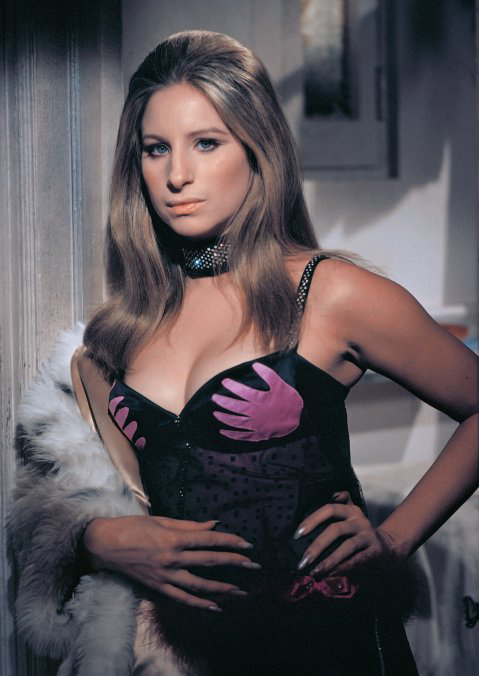
I love art glass. My day is made when I find a piece of mold-blown Gallé. I love the flowing, unending line of art nouveau furniture. It makes me cry it's so beautiful. It's like seeing a beautiful sunset to see a great piece of furniture. I have this art nouveau screen and the embroidery on the panels took somebody such a long time to do. My life is all so complicated that I do so envy and admire anybody who just sits and embroiders.
My life now is trying to find out how to get the most out of my life. As one learns to accept one's self, to appreciate one's self, the need for performing, for reassurance lessens, and that's what is sort of happening to me. There are also so many other things to do. I'd love to run a great restaurant. I've always thought of having a restaurant with barber chairs, so that in between courses you can lie back and relax—maybe have a shave, or a manicure. I can't wait for the time that I can open an antique shop. But if I know myself, when somebody wanted to buy something, I'd say, no, it's not for sale. But you can borrow it, if you bring it back.
I'd like to have time to go back to my French lessons or Italian—or piano. I once started to study piano theory and that was fascinating —to create sound and tone from a mathematical concept, to be able to say that something I hear in my head is an F-sharp minor chord with a flatted fifth. I studied piano till my teacher said I had to cut my nails. I said, "I'm not going to be a concert pianist—so what if I do make clicking noises on the keys?"
Sometimes I feel that it's cheating to say somebody else's lines, that the real art is in functioning easily in life, making up your own. Living in these precarious times is very difficult. It's easier to go to the moon.
I look forward to working less and simplifying my life, to fulfilling some of my potential as an individual and as a woman. My little-girl fantasy of being a recording star, a theater star, a concert star and a movie star is impossible to maintain; each of them suffers. There is so much else to learn, so much more to do. What I'd like is more time—time not only to read the stacks of political journals that have been piling up, but also time to read Good Housekeeping to find out different ways to decorate my son's sandwiches.
END.
Lawrence Schiller Outtakes
The amazing Lawrence Schiller, who photographed many of the great shots from On A Clear Day You Can See Forever, captured the double-exposure photograph that appeared in this 1970 issue of Life Magazine.
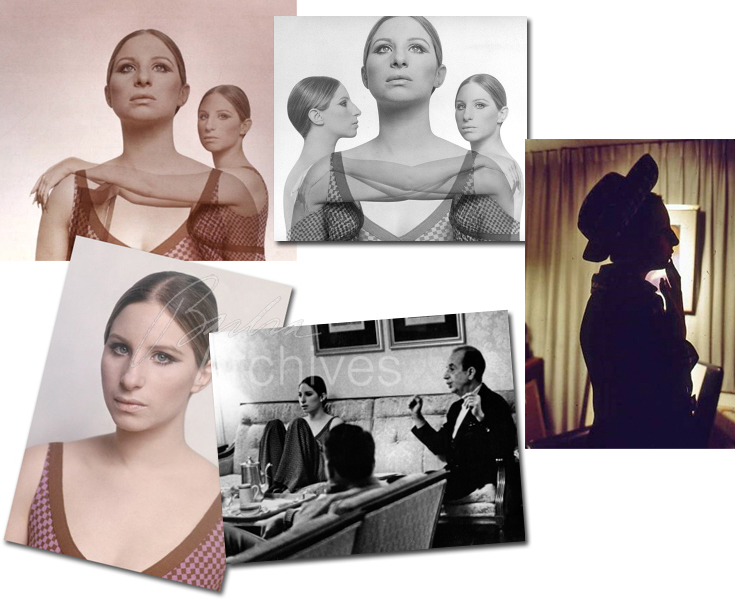
Lawrence Schiller told the story behind these photos in his 2014 art book Barbra Streisand:
One night after Vincente Minelli and the others had gone home, Barbra and Cis Corman were up late going through some paperwork in her suite at the Plaza. I'm across the room taking pictures, trying to capture the mood, and it dawns on me that Barbra looks different somehow. She's wearing hardly any makeup, her hair is pulled back, and she's in just a simple houedress. Turns out it was a jumpsuitby the California designer Rudi Gernreich, but it looked like a housedress to me. I'd never seen her like that. So I said to her, “Why don't I just set up my lights and try to shoot a cover for Life?” [ ... ] She resisted, wanted to know exactly what we were doing. I had no idea, so I just said, “Come on, let's try to do something different.”
She finally conceded, but it was clear that she was only going to give me the time to shoot one roll of film. l moved my strobe lights into the bedroom and asked her to sit on the side of the bed that had a clean wall behind it and to look straight at me, chin down, not up, like she usually did. After about five exposures I got a chair from the desk in the living room. When l walked back into the room I noticed her face from another angle. The side of her face looked nothing like the front of her face. “Barbra. let me shoot your profile now.” No response, so I just took the chair and asked her to sit on it backward, with her hands stretched forward over its back. The image was there. She raised her head, like Queen Nefertiti. Another five frames. A week later after the film had been developed I sandwiched two transparencies together. It was like a double-exposure, which showed the "two sides of Barbra." Life didn't run it on the cover but published it as an interior double page with the title “Who Am I Anyway?”
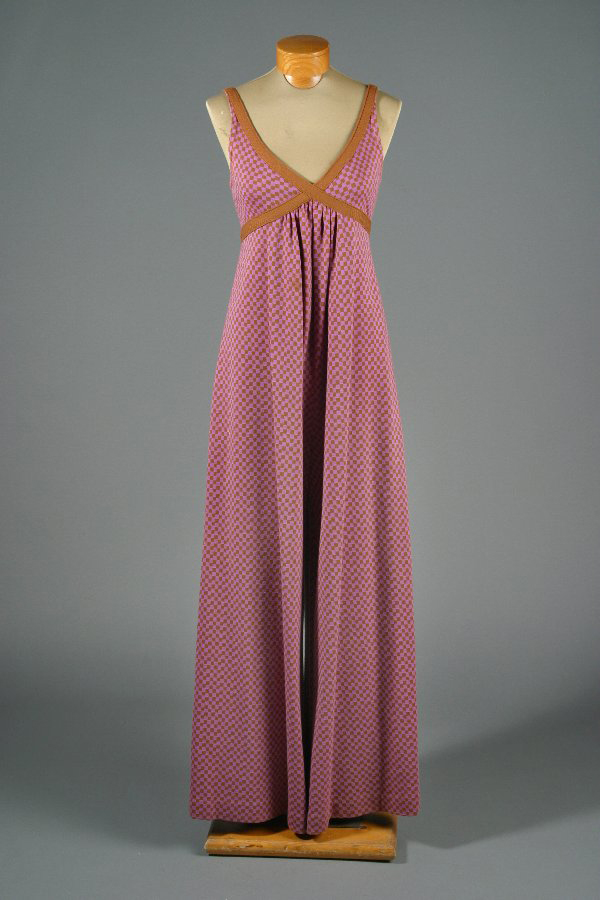
About the outfit Streisand wore for this shot: It was auctioned in 2004 and described as “1960s Wool Culottes”. Streisand wore a full length sleeveless jumpsuit, featuring straight leg culottes opening in to bell bottoms. The auction catalog described it further as “knit in a purple and brown check pattern, the piece is typical of the Gernreich designs of the period.”
End.
[ top of page ]
